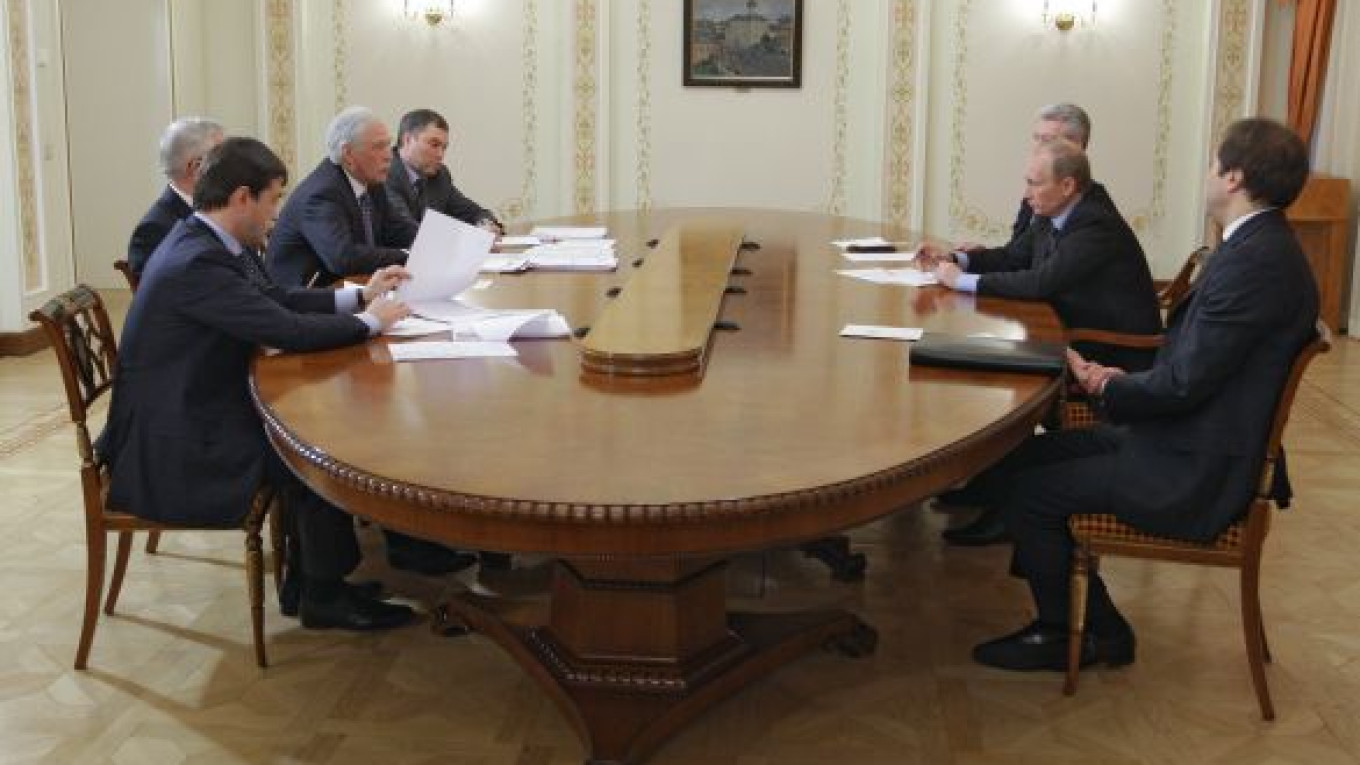Prime Minister Vladimir Putin on Friday called on United Russia leaders to stay in touch with the people and warned the party against bamboozling voters by making promises it cannot keep, a week after a massive anti-government protest in Kaliningrad.
"You must not promise everything to everybody all at once," Putin told top officials of the country's ruling party, which he chairs, at a meeting at his Novo-Ogaryovo residence.
"You mustn't become 'promise makers,' who just make promises to throw dust in peoples' eyes so that you can get into power and start settling your own personal problems," he said, according to a transcript on the government web site.
Putin added that the party should also admit its mistakes, which requires feedback and contact with the people. "Otherwise, any political work leads to a dead end," he said.
Neither Putin nor State Duma Speaker Boris Gryzlov, head of the party's faction in the Duma, mentioned Kaliningrad in their remarks. Vyacheslav Volodin, United Russia's secretary general, told reporters after the meeting that the Jan. 30 protests were not discussed.
Most observers, however, saw Putin's comments as a reaction to the rally, where some 10,000 protested against higher taxes and the regional and national leadership. The largely unexpected protest in the western exclave, the largest to hit the country in years, sent shivers through United Russia, which boasts a crushing 70 percent majority in the State Duma and similar strength in regional legislatures.
Gryzlov said at the meeting that United Russia hoped to field candidates for 90 percent of the regional and municipal seats available in the March 14 elections. He also said the other parties with factions in the Duma were essentially setting themselves up for defeat in the next federal elections because they had candidates for no more than 10 percent of the races.
Voters will select regional lawmakers in eight regions and mayors to five regional capitals, Gryzlov said, adding that voting would take place in 76 regions.
But analysts have said United Russia appears worried ahead of the vote and that a sudden dispute with A Just Russia, the country's other main pro-Kremlin party, appeared to be an attempt to distract attention from the Kaliningrad protest.
United Russia officials have been firing a barrage of criticism at Just Russia leader Sergei Mironov after he offered some mild criticism of Putin on Feb. 1, saying he disagreed with the government's 2010 budget and some of its anti-crisis measures.
Among the most outspoken was Volodin, who demanded that Mironov, a long-standing Putin loyalist, be ousted as Federation Council speaker. He and other United Russia leaders suggested reforming the Federation Council so that senators could build factions along party lines.
The upper house of parliament now has two representatives for each of the country's more than 80 regions. Because most regions are dominated by United Russia, introducing factions would give the ruling party more dominance in the chamber, including a possible impeachment of its speaker, which is impossible under current regulations.
Mironov said Friday that such a reform could only happen once senators are popularly elected. The council's members are now appointed by regional legislatures and executives. He also fired back at United Russia officials, who had compared him to Koshchei the Immortal, an evil character in Slavic myths.
"I would like to tell those Ivan-the-Fools they do not need to wait," he told reporters, Interfax reported.
Putin did not mention the dispute Friday, and Volodin refused to say whether the prime minister supported the party line.
A United Russia spokeswoman told The Moscow Times before the talks that the issue was not on the agenda. Participants would discuss party projects, the regional elections and the situation in the country's single-industry towns, the spokeswoman said, who requested anonymity because she did not have authorization to speak to the press.
A Message from The Moscow Times:
Dear readers,
We are facing unprecedented challenges. Russia's Prosecutor General's Office has designated The Moscow Times as an "undesirable" organization, criminalizing our work and putting our staff at risk of prosecution. This follows our earlier unjust labeling as a "foreign agent."
These actions are direct attempts to silence independent journalism in Russia. The authorities claim our work "discredits the decisions of the Russian leadership." We see things differently: we strive to provide accurate, unbiased reporting on Russia.
We, the journalists of The Moscow Times, refuse to be silenced. But to continue our work, we need your help.
Your support, no matter how small, makes a world of difference. If you can, please support us monthly starting from just $2. It's quick to set up, and every contribution makes a significant impact.
By supporting The Moscow Times, you're defending open, independent journalism in the face of repression. Thank you for standing with us.
Remind me later.


